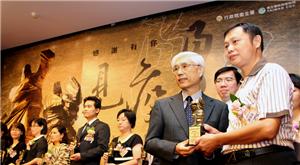2012 Epidemic Prevention Awards Ceremony recognizes 47 prizewinning units for initiative and courage
 In the morning of September 19, 2012, the Taiwan Department of Health (Taiwan DOH) and the Taiwan Centers for Disease Control (Taiwan CDC) held an annual awards ceremony at the NTUH International Convention Center honoring those who have made commendable and significant achievements in epidemic prevention. Tzou-Yien Lin, Deputy Minister of the Department of Health (DOH) recognized 47 groups and individuals with awards, heartfelt thanks, and encouragement for their work in epidemic prevention.
In the morning of September 19, 2012, the Taiwan Department of Health (Taiwan DOH) and the Taiwan Centers for Disease Control (Taiwan CDC) held an annual awards ceremony at the NTUH International Convention Center honoring those who have made commendable and significant achievements in epidemic prevention. Tzou-Yien Lin, Deputy Minister of the Department of Health (DOH) recognized 47 groups and individuals with awards, heartfelt thanks, and encouragement for their work in epidemic prevention.
Deputy Minister Lin pointed out that the success of national public health efforts requires not only the commitment of the government and health professionals, but also the involvement and cooperation of the general public. Each and every winner recognized has planted seeds of good disease prevention, and through their courage in tackling such a broad and complex problem, the fruits of their labor have set the groundwork for future disease prevention efforts.
This year, Taiwan CDC selected 47 winners from a total of 135 competitive candidates. From health centers that formed their own touring performance troupe to spread disease awareness to corporations that encouraged employees to take a paid leave of absence to prevent the spread of diseases, the panelists were impressed by how creatively and earnestly participants invested in disease prevention. The collective efforts done by physicians, nurses, caretakers, and volunteers to prevent the spread of dengue fever in townships, campuses, shelters, and prisons have demonstrated that any prevention goal can be achieved.
Macronix International Co., Ltd. won the award in the non-government division for providing public health care services at its company health center for its 4,800 employees. They instituted a comprehensive epidemic prevention system for the entire company as well as a toolkit specifically designed to protect the health of its employees on business trips abroad. Macronix even established a program whereby employees were allowed paid sick leaves to prevent the spread of diseases, and offered employees free influenza vaccinations.
The individual award for government-related public service went to Na Yi-fen, a kind-hearted DOTS careworker in the health center in Da-Tueng Village, Yilan County. She implemented a plan to deliver necessary TB drugs to the indigenous population, which makes up more than 90% of her caseload. To achieve this, she shuttled between villages in a black jeep—rain or shine—for more than four years. During all these years, the most difficult challenges she encountered in delivering life-saving drugs to aboriginal tribes everyday, she said, included inclement weather, treacherous mountain fog, and poor road conditions.
Other recipients of the awards in the non-government division include a team of volunteers dedicated to the prevention of mosquito-borne diseases and providing community service in Madou District, Tainan City. An 82-year-old volunteer Lin Shui-teh and his 81-year-old wife, Lin-Wu Bao-zhu, joined the team soon after it was established, becoming the oldest volunteer couple ever to register. For more than a decade, exemplary volunteer teams have gathered resources and made headway in mosquito control and prevention of diseases for the betterment of society.
In another example of commendable public service, Li Qing-min, a head nurse at the National Taiwan University Hospital for more than 20 years, began serving the AIDS community when the condition was still widely unknown and misunderstood. Although Li served as the head nurse, she took care to ensure that AIDS patients lacking care or from prisons received the best and most comprehensive clinical care. In addition, she helped AIDS patients return home and provided follow-up care after they were discharged from the hospital. Li even spent her vacation time to visit the shelters from Taipei to Pingtung to better understand the environment and the quality of care available to those patients as well as to help them make informed decisions on post-hospital care.
Through these awards, Taiwan CDC hopes to encourage research on disease prevention and participation of major contributors from all walks of life to prevent the spread of infectious diseases, recognize outstanding work of individuals and organizations as role models in the field, and encourage all sectors of society to promote disease prevention in order to build a healthier society.

